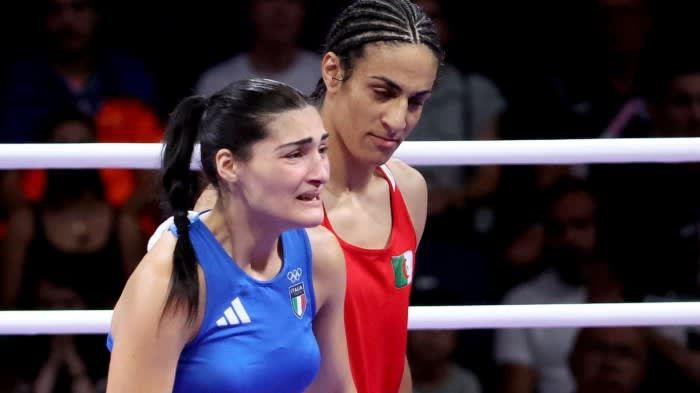Olympics chiefs blame ‘misleading information’ for women’s boxing row

Access the Editor's Digest at no cost
Roula Khalaf, the Editor of the FT, picks out her preferred articles for this newsletter that comes out every week.
The International Olympic Committee has supported its choice to permit two boxers to participate in Paris who were previously banned from the sport's world championships for not meeting gender eligibility requirements. They stated that the controversy was being exaggerated by inaccurate information.
The choice made by the IOC to allow Imane Khelif from Algeria to compete in the women's welterweight division at the Olympics has caused Italy's Prime Minister Giorgia Meloni to express disapproval. On Thursday, Khelif's Italian opponent withdrew from their bout less than a minute after it started.
Khelif participated in the Tokyo Olympics in 2021, but along with Taiwan's Lin Yu-ting, was not allowed to compete in last year's world championships by the International Boxing Association because they did not meet the criteria to compete as women. However, both athletes were given permission to compete in Paris by the IOC. Lin, the 2022 featherweight world champion, is scheduled to fight on Friday.
Further complicating the situation is the fact that the IBA, the organization that excluded Lin and Khelif, was also put on hold by the IOC in 2019 as the worldwide regulating body of the non-professional form of the sport. This was due to worries about its financial situation, moral standards, and management.
The IOC now has temporary control over boxing at the Olympics and has justified its decision on Thursday, stating that the two athletes were unfairly affected by a sudden and random choice made by the IBA.
The IOC stated that they have come across inaccurate information in reports regarding the participation of two women athletes in the Olympic Games Paris 2024. The IOC believes that the criticism towards these athletes is unjust, as the decision against them was made arbitrarily and without following the necessary procedures, despite their long history of competing at a high level.
In the Olympic realm, each sport has its own set of rules for how athletes qualify to compete, including rules regarding gender eligibility. World Athletics, which oversees track and field, updated its rules in recent years to restrict certain events for athletes with differences in sexual development, like South African runner Caster Semenya.
Earlier in the week, the IBA announced that they had banned the two boxers from participating in future competitions after a thorough evaluation. They stated that the decision was crucial in order to maintain fairness and integrity in the competition. Although the specifics of the tests carried out were kept confidential, it was revealed that neither of the boxers underwent a testosterone examination the previous year.
Earlier this Thursday, Meloni expressed disappointment in the IOC for not properly looking out for female athletes and preserving the fairness of the competition. Meloni, who was in Paris to cheer on Italian athletes, pointed out that the levels of testosterone in the Algerian athlete's blood seemed to give her an unfair advantage during the fight against Angela Carini.
The Italian boxer explained to the media that she decided not to participate in the Thursday match in order to protect herself, after Khelif's hit caused an injury to her nose.
The IOC and IBA have been in conflict for a long time over various issues, one of them being the IBA's decision in May to give money rewards to gold medal winners in Paris. The IOC expressed concerns about the IBA's financial connections to Russian gas company Gazprom. "Once again, it is not clear where the funds are coming from," the IOC stated at that moment.
Due to the dispute between the two organizations, boxing has not been confirmed as a sport for the 2028 Los Angeles Games. This is surprising, as boxing has been a staple in the Summer Olympics since 1904, with only one exception.













































